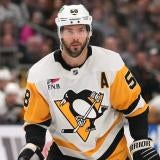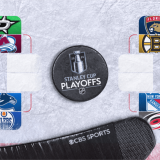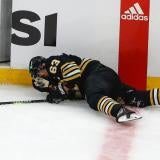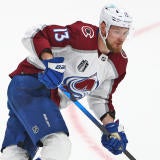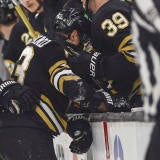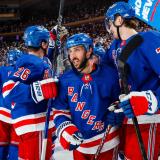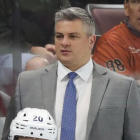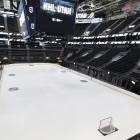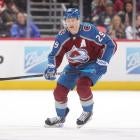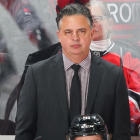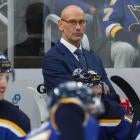
More NHL offseason: Rumors | Top 50 Free Agents | Buyout Tracker | Trades | Transactions
Ah, hockey in the summer, where things come to a grinding halt for about two months in between one long season and another. To fill the void we at Eye on Hockey thought it would be fun to make an all-time team for each of the 30 organizations in the NHL today.
The ground rules: The teams will consist of a center, two wings (regardless of which side), two defensemen and a goaltender. A player must have spent at least 200 games with a franchise to be considered. So Bobby Orr won't be on the Blackhawks' roster or Wayne Gretzky for St. Louis.

Part of the first wave of NHL expansion, the Pittsburgh Penguins organization has been home to some of the greatest players ever to play the game. Those three Stanley Cups also don't hurt in building a tradition of pretty excellent hockey.
In what came as a bit of a surprise to me, this was a tougher list to put together. There's a lot of good options, which makes it tough to narrow down to one guy per position, at least for a few. The notable omissions are many for this club.
Before we get started however, here's how the Pens unveiled their first home jersey. According to pittsburghhockey.net, this is the United Fund's "Miss Torch" modeling in May of 1967.
 |
| Center |
Mario Lemieux: Sidney Crosby may be the Penguins present and future, but even as good as Sid the Kid is, it's hard to see him ever unseating Super Mario from this spot. Lemieux is simply one of the greatest to ever play in the league and had he not had some of his best years interrupted by Hodgkin's disease and injuries, we might be comparing him much more favorably to Wayne Gretzky and Gordie Howe.
Regardless, Lemieux put together a brilliant career. Despite never playing a full season, the Penguins first-overall pick in the 1984 NHL Draft put up 690 goals and 1,033 assists for 1,723 points over his career, all franchise records. Lemieux's first point came on a goal on his very first shot of his NHL career.
After a few years of showing dominant offense, Lemieux scored 70 goals and put up 168 points to win the Art Ross Trophy as the league's leading scorer in 1987-88. He also broke up Wayne Gretzky's streak of eight consecutive Hart Trophies that year when he was named the league's MVP. Lemieux won the Ross again with an 85-goal, 199- point season, the best of his career, in 1988-89. Super Mario captured the Ross six times total over his Penguins career.
Then came the Stanley Cups. Lemieux was dominant in the team's first Stanley Cup run with 43 points in 23 games. He scored one of the great goals in Stanley Cup Final history as well.
The Penguins won the Cup again the following year, again with Lemieux starring. He also won his second Conn Smythe. It was during the next season, one in which Lemieux was on record pace, that he was diagnosed with Hodgkin's disease. He took some time away to get treated and returned to the team that very season. Lemieux put up 160 points despite playing just 60 games.
After more battles with illness and injury, Lemieux retired for the first time in 1997. He was immediately inducted into the Hall of Fame, had his No. 66 retired and became owner of the team, but he later decided to make a comeback in the middle of the 2000-01 season. Fittingly, Lemieux scored in his very first game back.
Lemieux put up 76 points that year showing he had plenty left in the tank. He pieced together a few more seasons, but never was able to play more than 67 games. Lemieux officially passed the torch to Sidney Crosby after the 2005-06 season, in which the owner played with his club's future superstar.
Lemieux remains an owner of the team and was instrumental in keeping the Penguins in Pittsburgh even in some of the franchise's darkest times. It has become one of the league's most successful teams in the last five years.
| Wings |
Jaromir Jagr: Over 11 seasons with Pittsburgh, Jagr was able to establish himself as one of the best wingers in the history of the league. A six-time first-team all-star selection while with the Penguins, Jagr won the Art Ross trophy as the league's scoring champion five times in Pittsburgh.
Jagr is second all-time to Lemieux in franchise history in games played (806), goals (439), assists (640) and points (1,079). He also was part of both Stanley Cup teams in Pittsburgh. After a modest showing in his first postseason as a rookie during the 1991 run, Jagr played a starring role in 1992. Here's one of his best highlights from the repeat bid.
Except for his rookie year, Jagr never scored less than 32 goals in a season while in Pittsburgh. In 1998-99, Jagr posted a career-best 127 points and received the Hart Trophy as the league's MVP. He also served as the team's captain for three seasons.
Despite all of his accomplishments, Jagr may be best remembered for the greatest mullet the league has ever known. Check out this fantastically 90s hockey card from the 1993 All-Star Game (via PuckJunk.com). Who's ready for some laser tag?
 |
Kevin Stevens: There were a number of quality options for this slot including Evgeni Malkin, primarily a center who has played a bit at wing, Rick Kehoe and Jean Pronovost. In the end, Stevens' prolific scoring in the early 90s was just too hard to ignore.
He may have had the benefit of seeing a lot of time with Lemieux and Jagr, but Stevens put together a remarkable run in Pittsburgh. He played parts of 10 seasons with the Penguins, including the first eight of his career.
In Stevens' first full NHL season, he put up 70 points in 76 games. The next year, he totaled 86 points including 40 goals. That same season, Stevens had 17 goals to lead the playoffs in Pittsburgh's first run to the Stanley Cup in 1991.
After that first Cup, Stevens was off to the races. In 1991-92, he posted 54 goals and a career-best 123 points. The only Penguins in club history to have more productive campaigns under their belts were Jagr and Lemieux. In 1992-93, Stevens notched a career-high 55 goals and collected his second consecutive 100-plus point season.
Stevens was a first-team all-star in 1991-92 and was on the second team two other times. He's fifth in franchise history with 260 goals and eight with 555 points. Over his career, Stevens averaged 1.06 points-per-game. He was named to Pittsburgh's "Millennium Team" in 2003.
| Defensemen |
Paul Coffey: For the second straight day, Coffey is on one of our all-time teams. One of the great offensive defensemen of his or any era, Coffey averaged 1.33 points from the blue line while with the Penguins over four-plus seasons.
After coming over in a blockbuster trade from Edmonton in 1987, Coffey only played in 46 games in his first season, but managed to put up 67 points. The next year, he scored 30 goals and had 113 points. In 1989-90, Coffey had yet another productive year with 103 points and then 93 points the next season.
Coffey was part of the Penguins first Stanley Cup in 1991, but was traded the following season. He was inducted into the Hockey Hall of Fame in 2004 and is also a member of the Penguins Hall of Fame.
In the interest of an all-time team double-dip, here's a look at what Coffey did best, providing a perfect stretch pass to spring Jaromir Jagr for a breakaway and his first career hat trick.
Larry Murphy: I had a long inner debate between Ron Stackhouse and Murphy, with some consideration thrown to Ulf Samuelsson as well. Stackhouse has the longevity, but Murphy's stint in Pittsburgh was pretty fruitful for both the player and team.
Murphy came to the Penguins in a trade with the Minnesota North Stars in 1990-91, which was about the perfect time to arrive in Pittsburgh. He had a pretty quick impact as well. After a solid regular season, Murphy averaged a point-per-game during the Pens' Stanley Cup run in 1991. He was there for Cup No. 2 as well, posting 16 points that postseason.
Despite only 366 games in Pittsburgh, Murphy is fourth all-time among the franchise's defensemen with 301 points. He was elected to the league's second all-star team twice while in Pittsburgh and had the most productive campaign of his Hall of Fame career in 1992-93 with the Pens.
Here's a play showing just how good Murphy was in transition and jumping into the offensive play. Also stick around from a classic Mike Lange call on the goal.
| Goaltender |
Tom Barrasso: If you can believe it, Marc-Andre Fleury holds most of Pittsburgh's goaltending records as of now. That said, Barrasso was one of the better goalies in the league during his era, won a pair of Stanley Cups and probably won't have to wait too much longer for a call to the Hockey Hall of Fame. Therefore, he's the pick.
Barrasso came to Pittsburgh via trade in 1988 after a successful few years with the Buffalo Sabres, including winning the Vezina and Calder Trophies. He spent more than 11 seasons in Pittsburgh and made 460 appearances, which was a club record until last season.
Though the career numbers aren't as great by today's standards, Barrasso was solid in his day. He finished his Penguins career with an .895 save percentage and 3.27 goals-against average.
Barrasso was at his best, however, during the two Stanley Cup runs. In 1991, the netminder posted a postseason-best 2.60 goals-against average and .919 save percentage. He followed that up with a 2.82 goals-against average and .907 save percentage in 1992.
He is a member of the U.S. Hockey Hall of Fame and was named to Pittsburgh's "Millennium Team" in 2003 along with other Penguins greats.
Now I bet you think I'm going to show you a great save from Barrasso, but you'd be wrong (mainly because there aren't that many on YouTube). So instead, here's a great heads-up play by the Penguins goalie and tape-to-teap feather pass to Mario Lemieux for a goal. Seriously, what a play from Barrasso.
| Notable Omissions |
Ron Francis, Sidney Crosby, Ron Stackhouse, Rick Kehoe, Jean Pronovost, Evgeni Malkin, Syl Apps, Martin Straka, Sergei Gonchar, Ulf Samuelsson, Mark Recchi, Alex Kovalev, Joe Mullen, Kris Letang, Marc-Andre Fleury. And super secret honorable mention to Jean Claude Van Damme for saving 17,000-plus Penguins fans (and the Vice President!) in the action classic "Sudden Death."







